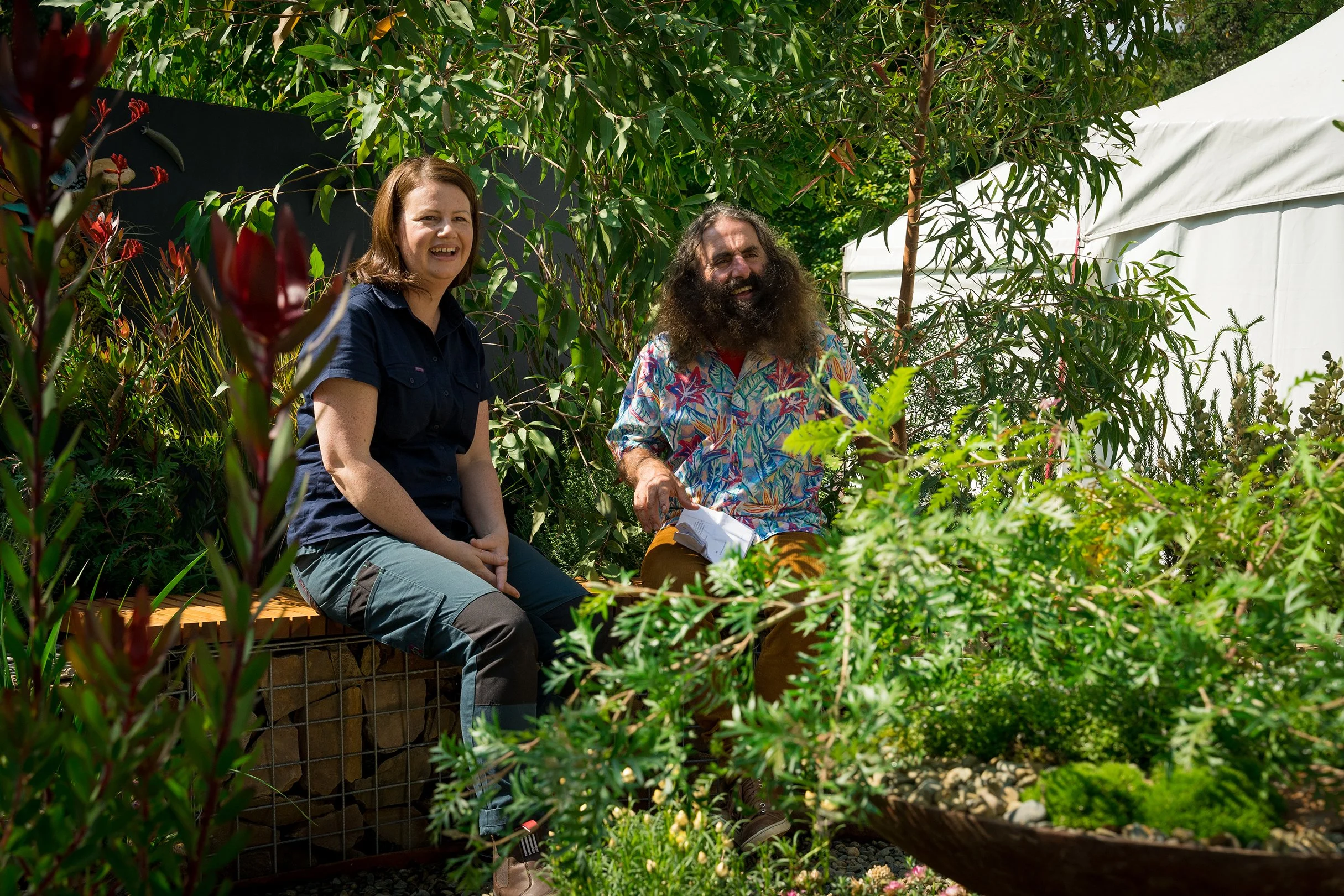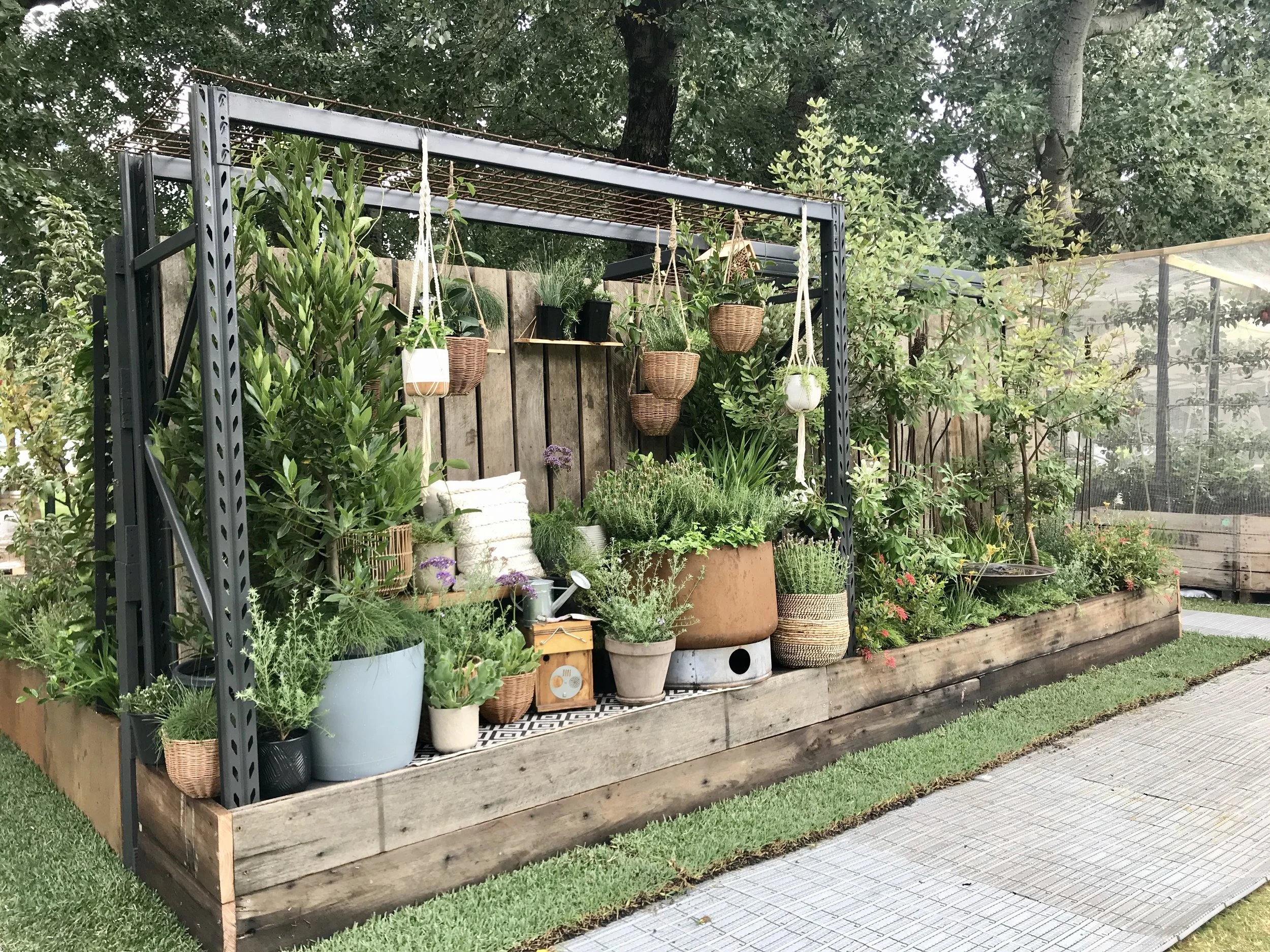
Past MIFGS Grant recipients
2025 MIFGS Grant recipient: Natalie Back
Natalie submitted a wonderful design that creates a tranquil setting featuring a soft colour palette, drought-resistant plants that offer sanctuary for wildlife, textural interest with feathery grasses and a range of foliage and a sustainable irrigation system. Her design will feature at our stand at this year’s Melbourne International Flower and Garden Show.
This is the third year we have offered our MIFGS Student and Emerging Designer Grant as an opportunity to support the development of the next generation of garden professionals. It provides them with exposure to the industry and general public at this prestigious show. Revenue from our garden openings and events is used to fund this initiative.
Our Chair, Dr Karen White spoke about our grant and Natalie’s winning design:
“Our mission is to broaden interest in gardening and to promote the health and wellbeing benefits of green spaces. So, we are delighted by the serenity of Natalie’s design, its soft colour palette, and the use of swaying ornamental grasses and textural plants. An unexpected whimsical element adds interest and surprise to this tranquil setting.”
Natalie is from Emerald and received her Diploma of Landscape Design and Diploma of Horticulture from Swinburne University in 2023. For the past 18 months, she has run her own business, Living Earth Design, where she applies her extensive gardening experience and professional design practice to create transformative and sustainable outdoor spaces.
Natalie is a passionate advocate for sustainable living, with a deep love for vegetable gardening and fruit trees. Her garden designs are inspired by her desire to reconnect people with nature, and she blends unique, environment-focused solutions with striking colour and texture combinations. Her naturalistic approach transforms outdoor spaces into harmonious environments that inspire and flourish.
She described her garden design: “When you sit in the garden, you will hear the wind rustling through the tall grasses and swaying spikelets. You might see bees drinking at the water bowl after pollinating the explosion of purple flowers. Or spot a lizard sunbaking on a rock before it scuttles away to a hidey-hole among dense plantings.”
The response to Natalie’s garden from MIFGS visitors was very positive, with many finding elements of the planting plan and features that they could incorporate into their home garden. Natalie was onsite each day to answer questions from visitors and to share her design knowledge with visitors to the stand.
““When you sit in the garden, you will hear the wind rustling through the tall grasses and swaying spikelets.””
2023 MIFGS Grant recipient: Emma Sheppard-Simms
Emma Sheppard-Simms was the recipient for our first MIFGS Student grant.
Emma is a landscape architect and University of Melbourne (Burnley) horticulture student. Her winning garden design was built and installed by an all-female trade team, in what is believed to be a first in the history of MIFGS.
“I’m delighted that Open Gardens Victoria has provided me with this opportunity. It’s so important that we showcase the skills of women currently working in the landscape industry. To this end, my garden will be entirely built by a team of female landscape architects, landscapers, horticulturists, and volunteers,” Emma said.
Emma’s garden design was selected from a strong field of applicants. The design stood out with its strong focus on the brief, demonstrating a diversity of plant choices, sustainable practices, and the promotion of the health benefits of gardening—all within the bounds of a charming, achievable design. Emma’s proposal to put together an all-female installation team added extra appeal to the project. Our hope was that women who saw the garden at MIFGS will be encouraged to take up a career in horticulture.
Called A Place for Us, the garden showcased the creative diversity of native plant species while encouraging biodiversity, water-wise gardening, and the use of sustainable, locally-sourced materials. A Place for Us demonstrates the power of gardens to accept and educate, to welcome and provide. It is a place for us all.
• A place for curious plant fans —visitors were drawn to the diverse, colourful, and playful use of native plants. The effect was a carpet of perennials, ground covers, and ornamental grasses.
• A place for water-wise gardening —a low-irrigation garden that collects and retains rainwater. Water drained along the gabion walls and was directed to a small rain garden and aquatic feature.
• A place for all living creatures —habitat for birds, insects, reptiles, and small mammals were found in the rocky shelter of the gabion wall, in the flowering undergrowth, and aquatic plantings around the rain garden.
• A place for supporting mental health —a garden antidote to the stress of the world. A green oasis, a place apart, a 'birdhouse for the soul'—a link to the natural world that is needed now more than ever before
• A place to celebrate the contribution of female designers and tradeswomen in the landscaping industry and acknowledge that construction sites are places where women with the right skills, tools, and talent are welcome.
“The garden was entirely built by a team of female landscape architects, landscapers, horticulturists, and volunteers.”
2024 MIFGS Grant recipient: Sarah McLauchlan
Landscape designer and graduate of the London College of Garden Design (Melbourne), Sarah McLauchlan, was the successful recipient of the 2024 Open Gardens Victoria Student Design Competition.
“I am absolutely thrilled that my design has been selected as the winning entry. This year’s theme, The Living Pantry, appealed immensely. The world of edible gardens holds such a special place in my heart. In fact, I have been crafting an urban edible oasis at my own home for the past seven years,” said Sarah McLauchlan.
The Living Pantry theme was designed to appeal to all, but especially those beginning the journey towards self-sufficiency. We were looking for entries that encouraged productive gardening and sound sustainability practices, even in small spaces.
Sarah’s entry stood out with its strong focus on the theme. Her installation integrated clever design with attractive, compact, and efficient productive garden spaces, incorporating significant use of recycled materials and water-wise practices, as well as considering sustenance and habitat for native fauna.
Called Nature’s Pantry, Sarah’s winning garden design drew on a childhood spent growing up on a farm in the south-east Riverina region of NSW, surrounded by an expansive garden, a bountiful veggie patch, and a flourishing home orchard. The garden’s built elements focus on sustainability, extensively utilising reclaimed materials such as timber, plywood boards, pallets, reo mesh, and salvaged pots, all sourced in Sarah’s previous life running a commercial demolition business.
“Nature's Pantry was conceived as a welcoming haven for visitors to enjoy a feast of nature's offerings,” said Sarah. “From pollinator-friendly plants and native grasses to habitats for small creatures and birds, the space is adorned with perennial edibles, fruit trees, herbs, veggies, and bush foods. Adding to the charm, there's a cosy tea garden, inviting visitors to pause and savour the experience of brewing amidst the flourishing abundance.”
“Nature’s Pantry was conceived as a welcoming haven for visitors to enjoy a feast of nature’s offerings.”






